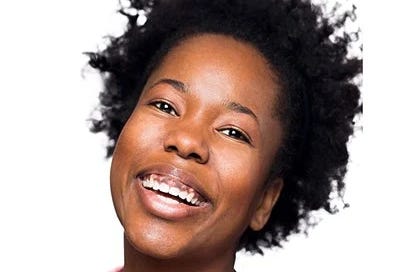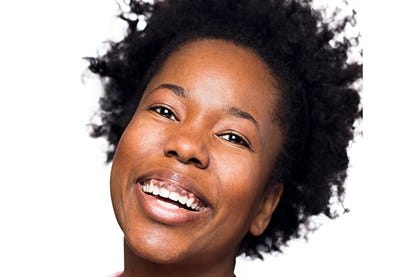There’s a scene in Libertié by Kaitlyn Greenfield that gave me chills when I first listened to it last spring. Describing a group of Black orphans fleeing from the New York City draft riots in 1863, Greenfield’s teenage narrator Libertié, says:
“I had never seen smoke mix with fog like that before, how it hovered like a curtain between this world and maybe the next, from heaven to hell, from sleep to consciousness. … It was a long boat, with four rowers — two at the bow, two at the stern — followed by two more …. Between the rowers, on the boats, were tens of children. What was most eerie about it all was that the only sound was the water slapping the oars. Even the babies were silent. But then the first boat docked, and the women all around me took in a deep breath, and they began to sing.”
And so did Channie Waites, the audiobook’s narrator. She burst into song, as the women in Libertié did.
Greenfield’s words combined with Channie Waites’s narration made for a magical listening experience. Channie is a performing artist, educator, applied theater practitioner and audiobook narrator. She draws on her extensive theater background to bring books to life for listeners.
Channie was kind enough to speak with me about her career path, the recording process and more. Our conversation has been edited and condensed for clarity.
How did you become an audiobook narrator?
I listened to audiobooks in high school and college, but I didn’t learn it was an industry for actors until I moved to New York. I was working on a show, and one of the other actors, a dear friend and mentor, shared their job outside of acting was audiobooks. And I said, “Really? You’re not working in a restaurant?” That piqued my interest.
Today, I have an agent who helps find me jobs, but when I was just starting out, I hustled and submitted myself. A friend of mine, a sound engineer, helped create my demo tape and, unbeknownst to me, they slid it to an audio company that they had recently worked with. They called me in for my first audition and then hired me to do additional work.
How does narrating a book compare to being on stage?
Recording a book takes the same endurance as being on stage, if not even more. But that energy has to be contained. You’re not trying to reach row number 100. So, the exertion becomes more internal and nuanced. Those skills of analyzing character and story and discovering objectives and voices all apply. One of the tactics I use is thinking of people in my world and how they relate to particular characters so I can gain insight into them.
You mentioned stamina. What’s your day look like when you’re recording a book?
I just finished one, and I’m exhausted. It’s all about focus. Audiobooks are a one-person show; you are channeling all of the characters. It’s quite an intense ask. I tend to have six-hour sessions, and then I try not to do anything that requires any talking afterward because you have to be conscious of consistency of voice.
My pacing is pretty strong. I tend to cover 40 pages every two hours. The equation I’ve discovered is for every one hour of the finished product, it’s typically two hours of recording.
I read straight through until I stumble or need a break. I enjoy working with engineers and directors. They allow me to just keep my narrator hat and focus on reading while they’re listening for the external sounds, mispronunciations or inconsistencies that could emerge, such as the wrong character voice.
You’ve worked on a broad range of projects, including fantasy and nonfiction. How does recording a children’s book compare to doing a long adult novel like Libertié?
It’s not so much age that changes things. It’s all specific to the content. I’ve got materials that are not quite light and airy. Recording children or YA books exploring the historical and present-day implications of enslavement or racism is not simple or easy. Perhaps sometimes it even requires more vulnerability because of an openness you have in YA or children’s books. What does change is the word count and the complexity of thought and language. But it’s about always finding the rhythm, regardless of the age group.
What have been some of your favorite projects to work on?
I’m often only cast, it seems, in roles that center a Black identifying character or written by a Black author. It’s limiting, but I love it. The very first audiobook I recorded was the first time that that director had ever had a book by a white author recorded by a person of color. So, in terms of the way that stereotypes related to casting show up is, it’s even in the voice world.
Claudette Colvin: Twice Towards Justice by Phillip Hoose was a very important text to be able to record. It was actually Claudette Colvin’s case that overturned segregation, not Rosa Parks’ case. Being able to record her biography was important to me. I’m very fond of the Zora and Me trilogy.
Thanks to Channie for speaking me. You can purchase one of the many audiobooks she’s recorded from Libro.FM.
I’ll be back on Monday with more book recommendations.






So interesting to read about this process--thank you!